Hosting a God’s Birthday Party during Covid-19
contributed by Emily Hertzman, 11 December 2020
Singkawang, West Kalimantan is a small city with a majority Chinese Indonesian population in Borneo. It is a center of Chinese Religion and called the “City of a Thousand Temples''. My ongoing research confirms that there are over 250 temples, including large denominations of international Buddhist as well as smaller temples venerating specific gods of locality. Additionally, there are hundreds of house altars dedicated to the possessing gods of individual spirit-mediums (Hakka. tathung). Singkawang is best known for its annual Cap Go Meh festival in which hundreds of possessed tathung ritually cleanse the streets of the city of harmful spirits.
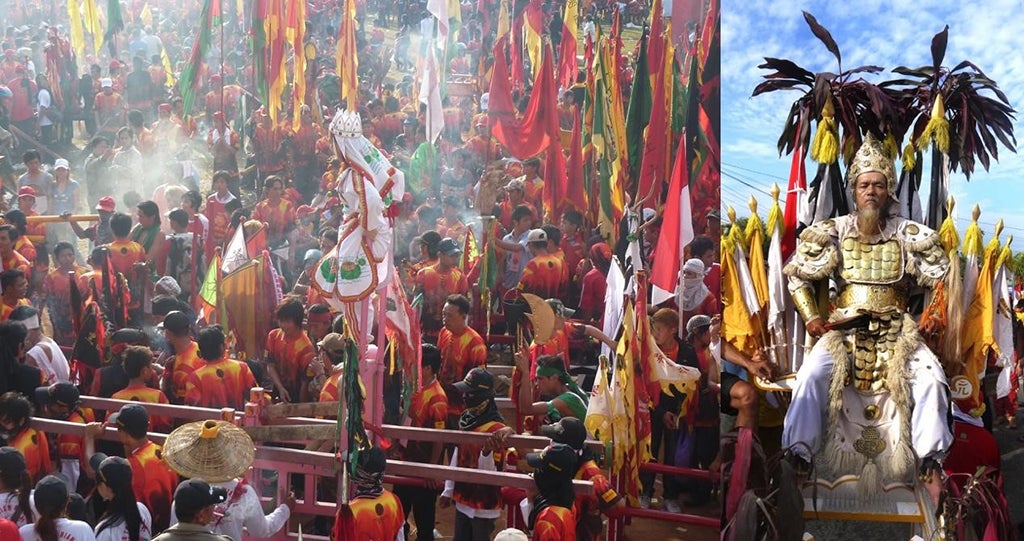
Figure 1. Cap Goh Meh, 2011 and 2015
With such a large concentration of Chinese temples, Singkawang has a busy ritual cycle in which large, multi-day God’s birthday parties figure most prominently. These events not only involve ritual, cultural, and social aspects, but are increasingly also a stage for a performance of local politics (Hertzman 2017). They include giving gifts to the Gods, ritual visits by invited tathung, public feasting and auctioning of blessed altar objects, as well as live music and other entertainments. Each God’s birthday party is a manifestation of the social network of the god and the temple and is a communal social gathering for the residents in the temple catchment area. In a complicated system of social, material and symbolic capital exchanges, these God’s birthday parties are an important social institution that reproduces from year to year the basic structures of Chinese religion in Singkawang, and also the social relations between members of different class and occupational groups.
Over the past ten years, these events have grown in size, added innovations with each passing year and, like other events in Indonesia, the success of a God’s birthday party is usually measured by how ramai (the Indonesian word for busy) it is. Ramai, in this case, carries a positive connotation, meaning something that has the attributes to attract people and their interest.
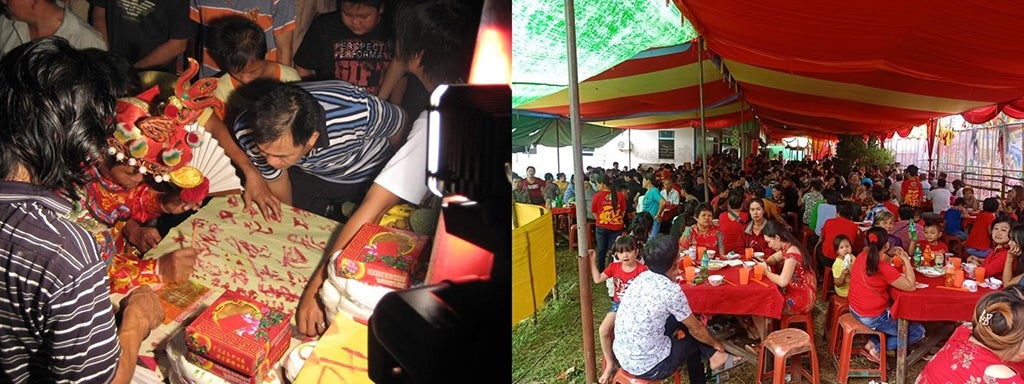
Figure 2. Crowds at God’s birthday party, 2011 and 2019 respectively
But how is it possible to host a God’s birthday party during the COVID-19 global pandemic, a time when restrictions on crowding (Indo. keramaian) have been implemented across Indonesia and other places in the world? Not holding such events, in order to avoid public gatherings, seems like the most judicious approach to follow regulations aiming to reduce the spread of the virus. However, when it comes to people’s Gods there is a sacred duty to perform the proper rituals. People exist in social relationships with their Gods and, like other social relationships, they do not want to abandon the traditions of marking these important dates. Furthermore, these gods are a source of spiritual strength for people - they go to them for help, advice, and salvation. At a time of healthy crisis, maintaining the proper social relations with the gods is more important than ever, particularly because they may be instrumental in curing the population.
What would happen if a temple failed to celebrate a God’s birthday during the pandemic? What consequence could arrive? What kind of faith, or lack of faith would that signal to the Gods? These are some of the considerations that temple committee members and tathung are asking as they try to determine whether or not, or how to hold these events this year.
On March 31, 2020, the Indonesian government issued regulation number 21 concerning the restriction of social activities on a large scale (Indo. Pembatasan Sosial Berskala Besar (PSBB)), which gave individual regions the ability to control social activities. This was followed on April 3, 2020, by the Ministry of Health issuing regulation 9 concerning the PSBB in order to accelerate the handling of COVID-19. This regulation outlines restrictions in several areas including religious activities. In the event of a full lockdown, which has happened in Jakarta, the regulation stipulates that places of religious workshop must be closed to the public and that all religious activities may only be carried out at home with relatives who are maintaining social distance. Furthermore, the regulation stipulates that all religious activities will be responsibly monitored by a government-sanctioned religious institution. This is a departure from the usual mechanism in which crowded public events are monitored by the police.
Normally to hold a busy public event, such as a large God’s birthday party that has a reception and a band, the temple committee would follow a procedure to request a Crowd Permit Letter (Indo. Surat Izin Keramaian) from the police.
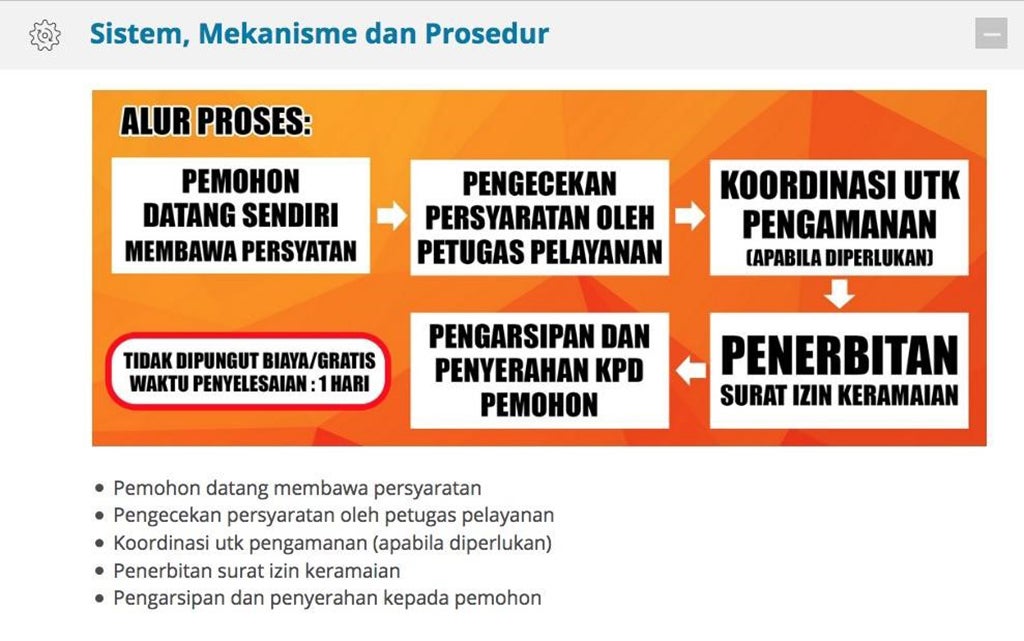
Figure 3. Procedure to request a Crowd Permit
However, a different procedure has since been improvised in accordance to special regulations concerning the restriction of social activities - with the holding of religious events during the COVID-19 pandemic now being assigned to religious authorities. Now the holding of a Gods’ birthday party must go through a Buddhist Council, such as the Buddhist Religious Development Institute (Lembaga Pembinaan Keagamaan Buddha). In order to seek this approval, the resident tathung, or the head of the temple committee, must provide a letter promising to adhere to the government-mandated COVID-19 health protocols, known as the 3Ms: Memakai Masker, Membersihkan Tangan, Menjaga Jarak (wear a mask, wash hands, maintain distance). This letter must be signed on top of a stamp and in addition, the temple must be willing to provide proof that they have a facility for hand washing, that guests are wearing masks and maintaining distance. Once this letter has been received, the Buddhist Council issues a permit letter, which includes a sentence stipulating that if the above mentioned health protocols are found not to be followed, the temple may be subject to scrutiny by the police.

Figure 4. 3M campaign infographic from the Jakarta Health authority
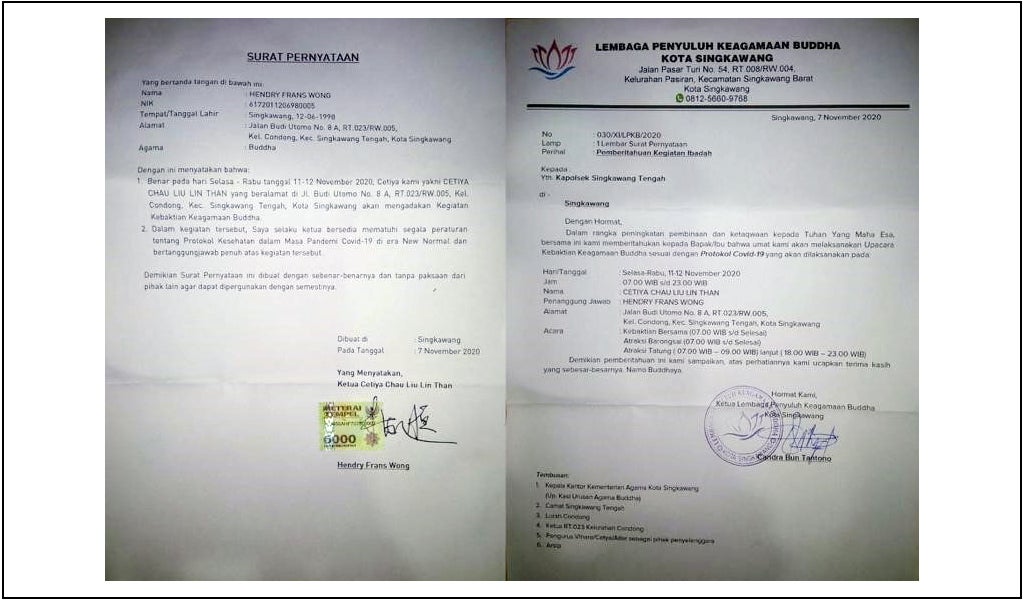
Figure. 5 Examples of permission letters for God’s birthday parties during COVID-19 pandemic, 2020
There does not seem to be anything outside of the ordinary within these improvised regulatory mechanisms. The issue lies, however, in the actual implementation of the 3M health protocols. These birthday parties ideally and ultimately involve crowding, especially during the ritual component of the celebration which takes place on the eve of the event. At this time, the resident tathung invites possessing gods to enter their body and perform special consultations, including the annual reactivation of the talisman of the god’s followers. Other tathungs invited also enter a state of possession in the evening to celebrate the Gods’ birthday. Crowds of locals gather inside and outside of the temple to witness the presence of the gods in the tathung. This can go on for hours depending on how many mediums have been invited and whether they come escorted by an entourage or apprentices. Given this, how can spectators and participants maintain distance in a situation that usually involves close bodily contact? The short answer is, they can’t. Not without significantly changing the nature of the event.
According to the new protocol, however, spirit-mediums themselves are absolved of the need to wear a face mask. This may be good news for these ritual specialists, whose work already requires them to don specialized costumes and head-dressings. They are also very physically active during states of possession, and often intentionally breathe in the fumes of burning resin incense. Speaking to their congregants, sometimes in different languages, usually with the help of an assistant is often a disjointed form of communication. As such, to add the obstruction of a face mask would only further impede understanding.
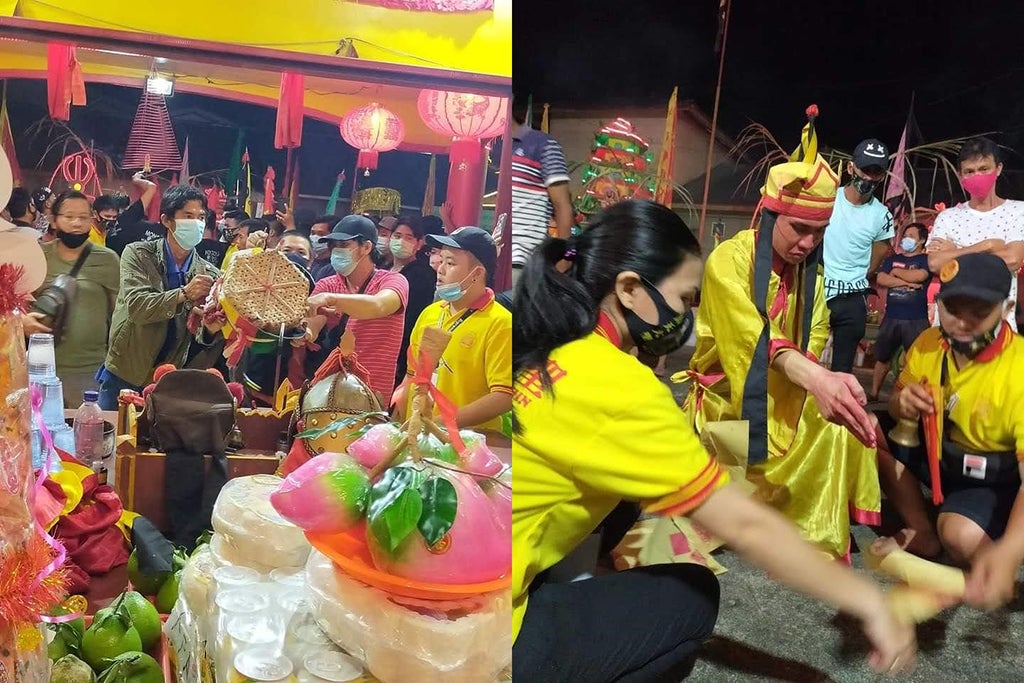
Figure 6. Spirit-Basket God (Choi Lam Shin) and a Tathung with masked assistants during a God’s Birthday Party during the COVID-19 pandemic, 2020
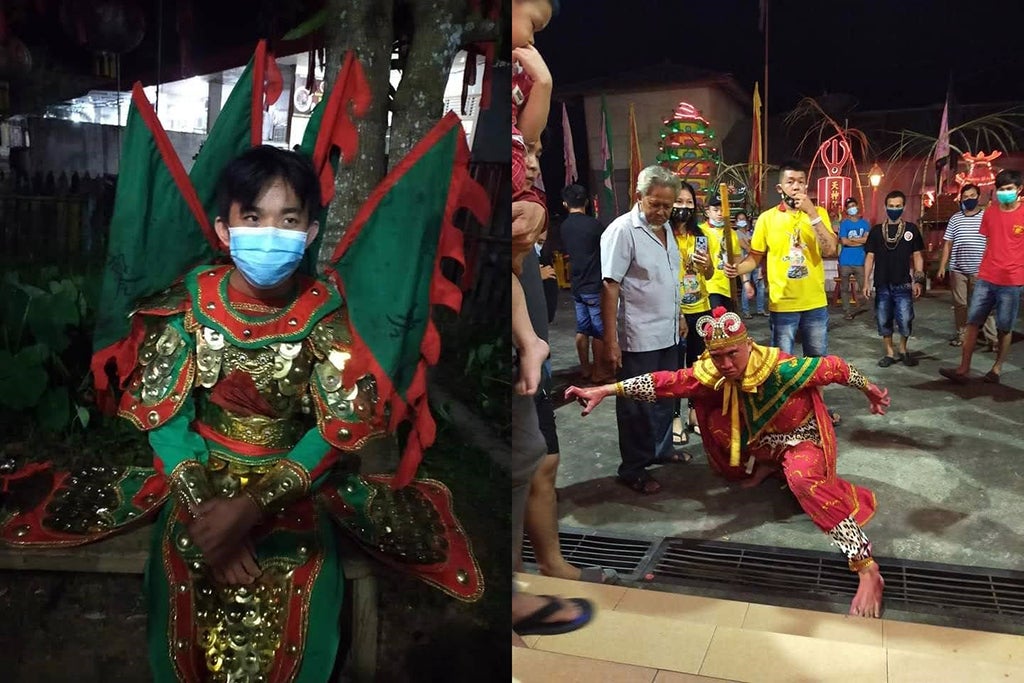
Figure 7. Tathung wearing a face mask while waiting to undergo possession and spectators maintaining physical distance at a God’ Birthday Party during the COVID-19 pandemic, 2020
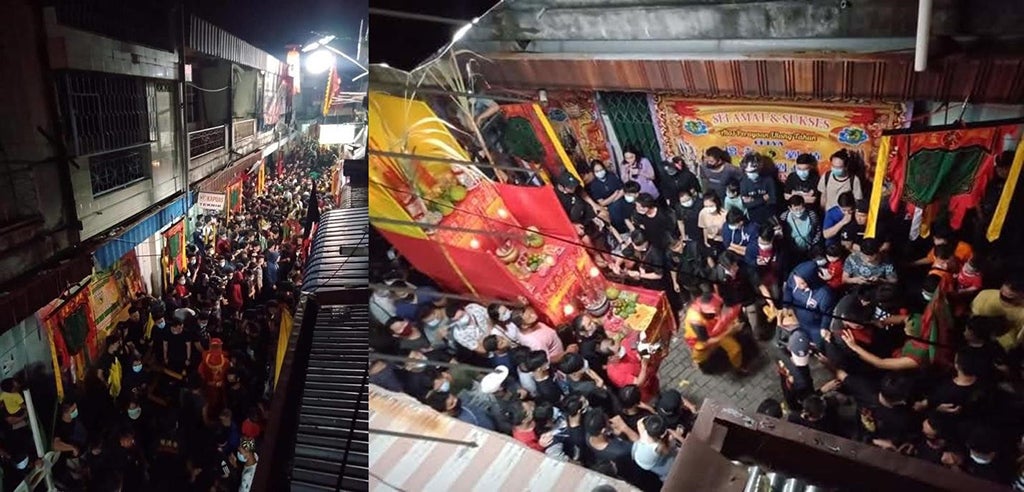

Figure 8 and 9. Crowds at two God’s Birthday Parties during the COVID-19 pandemic, 2020
As time goes by and the local number of COVID-19 cases remains low, the celebration of God’s birthday parties is slowly resuming, including a few cases in which temples are holding receptions, having karaoke and live music. These events reveal a range of adaptations to the situation, from proper maintenance of health protocols to total non-compliance. While masks might be present, people don’t always wear them, or wear them properly. Hand-washing stations exist, but are not widely used. People are maintaining physical distance to a certain extent, but it is not always possible. Ultimately, the celebrations of Gods’ birthdays are taking place despite the crisis, and that constitutes the important thing to maintain the sacred relationship with the gods.
Emily Hertzman is a sociocultural anthropologist whose research focuses on Chinese Indonesian mobilities and identities. She received a B.A and M.A. from the University of British Columbia and a Ph.D. from the University of Toronto (2016). She will be joining the Asia Research Institute in the Religion and Globalization cluster at the National University of Singapore as a Research Fellow in 2021.
Disclaimer: The views and opinions expressed in this article are those of the authors and do not necessarily reflect the position of the blog editorial team or the Asia Research Institute.
South Asia | Southeast Asia | East Asia | Other Places | Hinduism | Buddhism | Islam | Christianity | Other Religions

